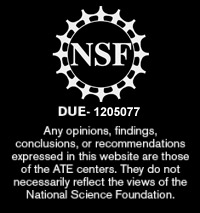
EvaluATE
Evaluation Resource Center for Advanced Technological Education
Kalamazoo, MI
www.evalu-ate.org
Contact
Lori Wingate
Principal Investigator (PI)
(269) 387-5922
![]()
![]()
![]()

EvaluATE Builds Capacity at ATE Colleges
EvaluATE helps ATE centers and projects develop their capacity to conduct useful and high-quality evaluations for their NSF-funded work. Sound evaluations provide information that enables grantees to be accountable to NSF. Moreover, they provide evidence of projects’ and center’s impact on students. These results help other educators and industry to identify ATE innovations to replicate.
The percentage of ATE principal investigators who formally evaluate their projects has increased from 84% of 167 in 2005 to 94% of 225 in 2015. In 2015, 91% of ATE grantees reported that they refined some aspect of their activities based on evaluation results.
Webinars & Blog Help Develop Evaluative Culture
Strong audience response has reinforced EvaluATE’s use of high-quality webinars to develop an evaluative culture in the ATE community. EvaluATE’s series of 90-minute, mixed-media webinars—offered in partnership with MATEC—attracts hundreds of participants annually. In recent years the audience for EvaluATE’s programs has grown to include administrators and grant development personnel at ATE and non-ATE colleges, as well individuals involved in evaluation at federal agencies, consulting firms, state and local governments, nonprofit organizations, and foundations.
EvaluATE’s weekly blog features writings by an array of ATE authors, including principal investigators (PIs), evaluators, grant writers, and others involved in STEM education evaluation. Topics include evaluator-PI relationships; presenting and using data; research; survey question development; partnerships; strategies to improve survey response rates; small project evaluation; professional development evaluation; institutional data sources; indicator development; gender evaluation; formative evaluation; evaluation procurement; evaluation for grant writers; embedded assessment; social network analysis; theory of change; and data visualization—among others. The blog prompts authors to reflect on their experiences with evaluation and to share their perspectives and lessons learned as well as the tools they used.



